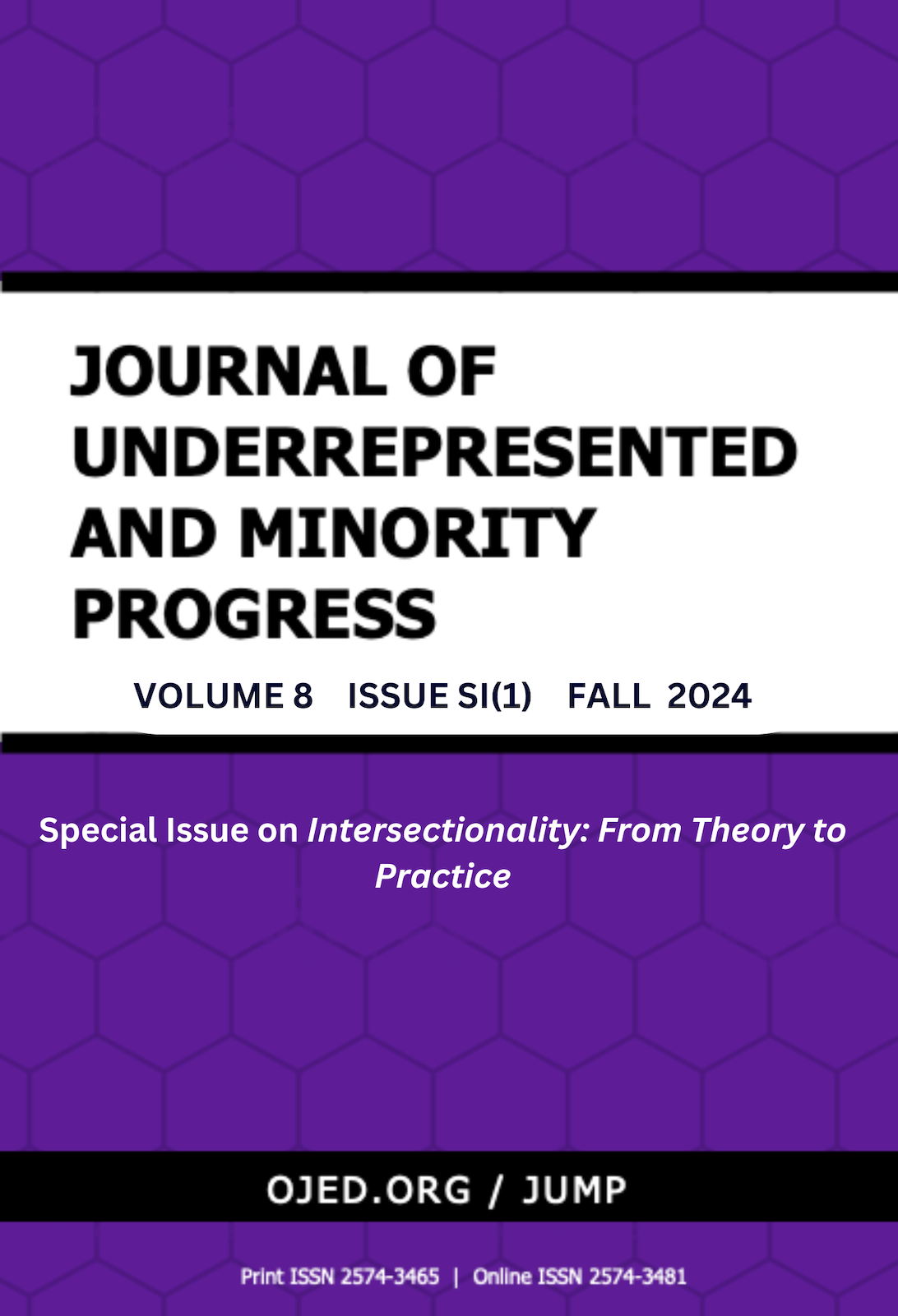An Examination of Sense of Belonging in Second Generation Afro-Caribbean College Women at a Hispanic-Serving Institution
DOI:
https://doi.org/10.32674/bhncqt60Keywords:
Hispanic Serving Institution (HSI), Afro-Caribbean, second generation, sense of belonging, intersectionalityAbstract
Hispanic Serving Institutions (HSIs) are classified by the percentage of the institution’s student population who self-identify as Hispanic (US Department of Education, 2021). While HSI designations are supposed to further support minoritized students, researchers studying HSIs have identified the need for more direct support. To further the conversation about the role HSIs play in the larger educational landscape we facilitated a case study that examined the experiences of second-generation Afro-Caribbean female students attending an HSI. This project aimed to analyze thoughtfully and intentionally in the hopes of highlighting the impact students' sense of belonging can have on their connection to campus. This qualitative case study evaluated the experiences of second-generation Afro-Caribbean female students and was guided by the following question: How can HSIs create a sense of belonging for second-generation Afro-Caribbean female students? Results highlight assessing sense of belonging among African Diasporic college at HSIs often may be excluded.
References
Crenshaw, K. (1989). Demarginalizing the intersection of race and sex: A black feminist critique of antidiscrimination doctrine, feminist theory and antiracist politics. University of Chicago Legal Forum, 1(8), 139–167.
Deutscher, N. (2018). What Drives Second Generation Success? The Role of Education, Culture and Social Context. https://doi.org/10.1111/ecin.12899
Garcia, G. A. (2019). Defining “servingness” at Hispanic-Serving Institutions (HSIs): Practical implications for HSI leaders. American Council on Education. https://www.equityinhighered.org/resources/ideas-and-insights/defining-servingness-at-hispanic-serving-institutions-hsis-practical-implications-for-hsi-leaders/
Garcia, G. A., & Dwyer, B. (2018). Exploring college students’ identification with an organizational identity for serving Latinx students at a Hispanic serving institution (HSI) and an emerging HSI. American Journal of Education, 124(2), 191–215. https://doi.org/10.1086/695609
Gist-Mackey, A. N., Wiley, M. L., & Erba, J. (2018). “You’re doing great. Keep doing what you’re doing”: Socially supportive communication during first-generation college students’ socialization. Communication Education, 67(1), 52–72. https://doi.org/10.1080/03634523.2017.1390590
Haynes, C., Joseph, N. M., Patton, L. D., Stewart, S., & Allen, E. L. (2020). Toward an understanding of intersectionality methodology: A 30-year literature synthesis of Black women’s experiences in higher education. Review of Educational Research, 90(6), 751–787. https://doi.org/10.3102/0034654320946822
Jones. (2016). Authenticity in leadership: Intersectionality of identities. New Directions for Student Leadership, 2016(152), 23–34. https://doi.org/10.1002/yd.20206
Karaman, M. A., Lerma, E., Vela, J. C., & Watson, J. C. (2019). Predictors of academic stress among college students. Journal of College Counseling, 22(1), 41–55. https://doi.org/10.1002/jocc.12113
Kalmakis, K. A., Chiodo, L. M., Kent, N., & Meyer, J. S. (2020). Adverse childhood experiences, post-traumatic stress disorder symptoms, and self-reported stress among traditional and nontraditional college students. Journal of American College Health, 68(4), 411–418. https://doi.org/10.1080/07448481.2019.1577860
McNair, T. B., Bensimon, E. M., & Malcom-Piqueux, L. (2020). From equity talk to equity walk: Expanding practitioner knowledge for racial justice in higher education. John Wiley & Sons.
Merriam, S. B. (1998). Qualitative research and case study application in education: Revised and expanded from case study research in education. Jossey Bass.
Muniz, H. (2021). How many college students are in the U.S.? Best Colleges. https://www.bestcolleges.com/blog/how-many-college-students-in-the-us/
Mwangi, C. A., Thelamour, B., Ezeofor, I., & Carpenter, A. (2018). “Black elephant in the room”: Black students contextualizing campus racial climate within US racial climate. Journal of College Student Development, 59(4), 456–474. https://doi/10.1353/csd.2018.0042
Nunez, A. M., Hurtado, S., & Galdeano, E. C. (2015). Why study Hispanic-Serving Institutions? In A. M. Nunez, S. Hurtado, & E. C. Galdeano (Eds.), Hispanic-Serving Institutions: Advancing research and transformative practice (pp. 1–22). Routledge.
Nguyen, T. H., & Nguyen, B. M. (2018). Is the “first-generation student” term useful for understanding inequality? The role of intersectionality in illuminating the implications of an accepted—yet unchallenged—term. Review of Research in Education, 42(1), 146–176. https://doi.org/10.3102/0091732X18759280
Osterman, K. F. (2000). Students’ need for belonging in the school community. Review of Educational Research, 70, 323–367.
Osterman, K. F. (2010). Teacher practice and students’ sense of belonging. International research handbook on values education and student wellbeing, 239-260.
Patton, M. Q. (2002). Two decades of developments in qualitative inquiry: A personal, experiential perspective. Qualitative social work, 1(3), 261-283.
Pike, G. R., & Kuh, G. D. (2005). First-and second-generation college students: A comparison of their engagement and intellectual development. The Journal of Higher Education, 76(3), 276–300.
Porter, C. J. (2017). Articulation of identity in Black undergraduate women: Influences, interactions, and intersections. In L. D. Patton, & N. N. Croom (Eds.). Critical perspectives on Black women and college success (pp. 88–100). New York, NY: Taylor & Francis.
Ryan, R. M., & Deci, E. L. (2000). Self-determination theory and the facilitation of intrinsic motivation, social development, and well-being. American Psychologist, 55(1), 68.
Stanislaus, E. P. (2020). We're here, we Exist: An exploration of how second-generation Afro-Caribbean college women make meaning of their race, ethnicity, and gender (Publication No. 4486) [Doctoral dissertation, Florida International University]. Higher Education Commons.
Steele, T. (2017). Retaining Black female college students: The effects of meritocracy on their ideas of success. College Student Affairs Leadership, 4(1), 7.
Strayhorn. T. (2012). College students’ sense of belonging: A Key to educational success for all students. Routledge. https://doi.org/10.4324/9780203118924
Strayhorn. (2019). College Students’ Sense of Belonging (2nd ed.). Routledge. https://doi.org/10.4324/9781315297293
Thelamour, B., George Mwangi, C., & Ezeofor, I. (2019). “We need to stick together for survival”: Black college students’ racial identity, same-ethnic friendships, and campus connectedness. Journal of Diversity in Higher Education, 12(3), 266–279. https://doi/10.1037/dhe0000104
Walkington, L. (2017). How far have we really come? Black women faculty and graduate students’ experiences in higher education. Humboldt Journal of Social Relations, 39, 51-65.


